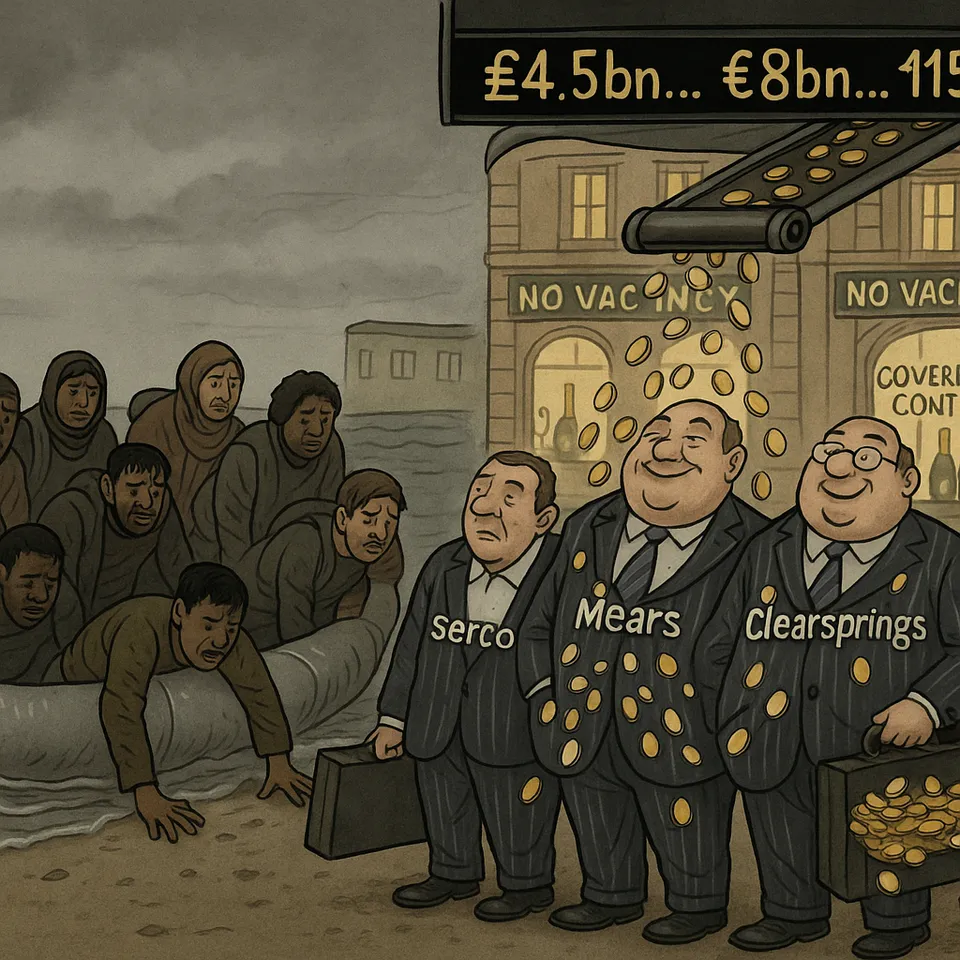Britain's Energy Crisis: A Policy Announcement or a Confession of Failure?

Asylum Accommodation Costs: A Cash Machine for Contractors
The National Audit Office has revealed what happens when political grandstanding meets contractual reality: asylum accommodation costs have exploded from £4.5 billion to £15.3 billion over ten years. This isn't a miscalculation—it's a masterclass in how modern Britain converts public crises into private profit.
The National Audit Office has revealed what happens when political grandstanding meets contractual reality: asylum accommodation costs have exploded from £4.5 billion to £15.3 billion over ten years. This isn’t a miscalculation—it’s a masterclass in how modern Britain converts public crises into private profit.
The Numbers That Matter
In 2019, Conservative ministers signed contracts they claimed would cost £4.5 billion over a decade. Five years later, the projected cost stands at £15.3 billion—a 240% increase that makes even HS2’s budget overruns look modest. The average yearly cost now exceeds what the government hopes to save by stripping pensioners of winter fuel payments.
Three companies: Serco, Mears, and Clearsprings have extracted £383 million in profits between September 2019 and August 2024. Clearsprings alone has seen its contract value soar from £0.7 billion to £7 billion, a tenfold increase that coincidentally benefits a company whose founder donated to the Conservative Party.
Hotels now consume 75% of the accommodation budget while housing only a third of asylum seekers. The NAO notes, with characteristic understatement, that providers “may profit more from hotels than other types of accommodation.” In the private sector, this would be called profiteering. In modern Britain, it’s called a public-private partnership.
The Institutional Farce
What makes this particularly revealing is how both major parties have embraced the same failed system. The Conservatives created these contracts in 2019. Labour, despite inheriting what they call “an asylum system in chaos,” has already confirmed they won’t trigger the break clauses that could end these arrangements next year.
A senior Home Office source claims ministers are holding the companies’ “feet to the fire” through “very regular” contact. The same source admits the contracts were “not in any state fit” when signed. Yet despite this admission of contractual incompetence, the same arrangements continue, the same companies profit, and the same taxpayers foot an ever-expanding bill.
The Home Office boasts that measures taken will “save the taxpayer £4 billion by the end of 2026”—a curious claim when the overall cost has tripled. This is the accounting equivalent of celebrating a discount on a grossly overpriced item you didn’t need to buy in the first place.
Patterns of Decline
This isn’t merely about asylum policy or immigration politics. It’s about how Britain now functions—or rather, fails to function—as a modern state. Every major government contract follows the same trajectory: lowball initial estimates, massive cost overruns, private profits, public losses, and no accountability.
The asylum accommodation shambles joins a distinguished list of British institutional failures: Track and Trace (£37 billion), HS2 (originally £32 billion, now over £100 billion), Ajax armoured vehicles (£5.5 billion and counting), and countless IT procurement disasters. The pattern is so consistent it can no longer be called incompetence—it’s the system working as designed.
What’s particularly damaging is how this undermines any serious discussion about immigration policy. When the basic mechanics of accommodation have been surrendered to profiteering, when contracts are signed that guarantee corporate windfalls regardless of outcomes, the entire debate becomes meaningless. You cannot have effective border control when you’ve already ceded control of the system to companies incentivized to maximize occupancy and costs.
The NAO reveals that ministers have “few levers” to control rising costs. This admission deserves scrutiny. Elected officials claim they cannot control contracts they signed, cannot end arrangements they created, cannot prevent profiteering they enabled. This isn’t democracy—it’s the managed decline of state capacity dressed up as private sector efficiency.
Reform UK threatens legal challenges to prevent hotel use in areas they control. The Refugee Council calls for working with local authorities instead of private contractors. Both miss the fundamental point: the system is now designed to resist political control, regardless of who wins elections or what voters want.
The Real Cost for Society
Beyond the £15.3 billion headline figure lies a more profound cost. Every billion overspent on asylum hotels is a billion not invested in schools, hospitals, or infrastructure. Every contract that enriches well-connected companies while failing to deliver basic services erodes what remains of public trust.
The Home Office source blamed “people smuggling gangs” for costs, claiming the border has been “handed over” to criminals. They’re half right—but the handover that matters happened in Whitehall meeting rooms where contracts were signed that guaranteed profits regardless of performance.
Britain has created a system where crisis generates profit, where failure is rewarded, and where democratic accountability has been contractually abolished. The asylum accommodation scandal isn’t an aberration—it’s British governance in 2025, where private gain and public loss have become so normalized that a 240% cost overrun barely makes headlines.
The question isn’t whether this system is sustainable. It clearly isn’t. The question is how many more billions will be transferred from taxpayers to contractors before someone admits that turning essential state functions into corporate profit centers was always going to end this way. In functional democracies, such admissions lead to reform. In declining Britain, they lead to new contracts with the same companies, signed by different ministers, promising this time will be different.
It never is.
Commentary based on Asylum accommodation costs set to triple, says watchdog by Jack Fenwick on BBC News.